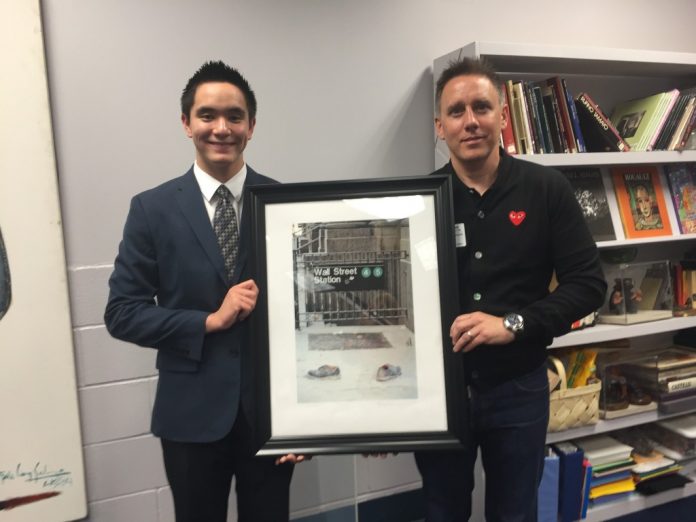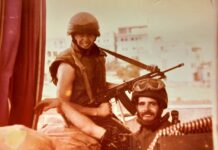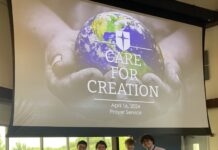Fredrick Douglas. Helen Keller. Caesar Chavez. What do these people have in common? All of them overcame hardships and difficulties to bring a message to the world. Paul McCormack represents the contemporary example of this brave heroism, devoting his entire life to the service of others despite the personal costs. He is the last man out, the last man out sacrificing his personal well-being for the good of others, the last man out bringing justice to the marginalized, the last man out of a burning building helping save others’ lives.
Paul Gerard McCormack was born in 1968, in Philadelphia, PA. His very religious parents named him after Saint Paul and Saint Gerard, two holy people whose influence they wished to impart upon their son. Unlike his parents, who both grew up in Donegal, Ireland, Paul was a naturally born citizen. His father moved to Brooklyn, and his mother to Philadelphia where she worked in a Catholic church’s rectory. They met at the Donegal Ball in New York, married, had seven children in Pennsylvania, and moved back to Ireland when they were all young. Growing up in the nation’s rural countryside presented extreme difficulties to the family since “It was a very depressed economy in Ireland, probably one of the worst depressions ever,” according to McCormack. Yet despite these bleak circumstances, he managed to make the best of the situation and solidify a strong education.
One of Paul’s oldest childhood friends is Martin Irwin, current preparator of the Ground Zero 360 exhibition. At the age of 12 years old, the two met at school, shared many common interests, and “played many sports together including Gaelic football, hurling, soccer and other athletics.” Martin’s massive family included thirteen children and his mother often didn’t note McCormack amidst the mass of siblings. Often times, Paul would have dinner both at their home and his own, Irwin laughed saying, “I’m amazed he’s not twice his size.” His childhood continued with this robust diversity of activities, his careful attention towards others extending into his adult ventures like Ground Zero 360.
McCormack finished high school in 1986 and began the difficult process of selecting a profession. Throughout Ireland at the time, only three jobs really were available: working in a bank, being a teacher, or serving as a garda (Irish police). This presented a huge challenge for McCormack because, as he recollected, “to get into college to be a teacher you needed money my family didn’t have, to work at the bank you needed a phone call or contact which we also lacked, and to be a garda you needed to be 5’8″. I was 5’7.” Using his US citizenship, Paul decided to stay in Ireland throughout the summer and emigrated to the United States in October. This transition issued in a host of new opportunities in the land of the free.
Although McCormack had been liberated of Ireland’s restrictive employment options, its strong cultural ties “gravitated [him] towards those positions, [his] first job in America was actually working at a bank, Chase Manhattan now called JP Morgan.” Holding onto a lot of activities from his youth, Paul met a team of other Irish-Americans playing Gaelic football and joined a construction company with them. After four years of difficult physical labor, he applied for the NYPD and joined in April of 1990. His commitment to others and inextinguishable discipline led him far, and within the short span of a decade Paul McCormack was already making history. Paul became the youngest captain in the history of the NYPD, assigned to the famous 41st police precinct. Made popular by the 1981 Paul Newman movie Fort Apache, this station situated in the Bronx set the stage for McCormack’s future accomplishments. During this exciting time, he met his wife Nicola McClean for the first time. Nicola was a staff photographer for the Irish Voice newspaper, sent by her boss to interview and photograph the new success. When McCormack walked into his office for the interview, she was sitting on his desk and wearing his police hat, which she tipped at his stunned expression. McCormack said from that moment he knew “it was love at first sight.”
Throughout all of Paul McCormack’s accomplishments shines unending sacrifices, his entire life devoted to the service of others. In 1997, McCormack donated his bone marrow to a total stranger to save her life, and in 2000, he gave a kidney to his sister Siobhan in her time of desperate need. Finally, on 09/01/2001, Paul sacrificed an essential piece of himself in service to others; he lost his eyesight. Chemicals, toxins, concrete, rubble, and smoke, all of these polluted his vision as he tirelessly fought against the scorching flames. Once he finally paused and went to receive medical care, he only flushed his eyes, took painkillers, and went back to work because “everyone wanted to be doing their work, there was no time to be sitting up in the hospital.” Losing his eyesight was a difficult emotional process, and Paul admitted, “It can get you depressed if you let it.” Every day we take for granted the countless advantages sight offers us as McCormack found it difficult “standing on the side of field unable to see [his kids] playing ball, not being able to read your mail or the newspaper, sometimes [he misses] the cup and it overflows, just simple simple things.” After witnessing the disease and death other rescue workers suffered, McCormack decided to focus on the positives of the situation, grateful for his life and family despite his adverse disability.
While McCormack fought fires and saved lives, Nicola captured the horrific tragedies surrounding the World Trade Center. The injury and death surrounding her created “a very silent and spiritual place, nearly 3,000 souls has passed and [she] could feel their presence.” McClean was determined to preserve the experiences surrounding her, particularly moved by the messages left on store windows, cars, and any reflective surface.” These messages etched in the dust were particularly upsetting,” she confessed, “They were so sad, so personal and full of pain. I couldn’t get their names out of my head. I would leave my studio heavy hearted with all of these names.” McClean’s quest to preserve these memories began by tracking down the emergency workers listed in these photos, many of them police or firefighters. Although many were wary throughout such a confusing time, “once [she] produced the photos from the dust, they knew we were genuine with good intentions.” Sorting through each of the heart-wrenching images took a heavy emotional toll, and “without Paul’s strength & guidance, I would more than likely not have [had] the stamina to start let alone complete such a massive undertaking.” Together, the couple completed Ground Zero 360, using McCormack’s close contacts and business savvy alongside McClean’s moving artwork and photography.
In 2011, once the exhibition had been completed and the 10th anniversary of 9/11 swiftly approached, fate once again reunited the childhood friends. Martin Irwin “asked for my input to help the exhibit with my art preparatory skills and, as my beliefs and ethics are similar to Paul’s, we all worked in unison to come up with the exhibit,” said McClean. Working together has brought the two even closer, Irwin sharing in the organization’s mission to forever preserve the memory of the heroism and bravery of 9/11. Martin has seen Paul grow “even more patriotic to his country and proud to be an American” since beginning his involvement in the organization. “He feels very strongly about what happened in 9/11/2001 and this is why he is the driving force behind the Ground Zero 360 exhibition.”
Traveling around the world to amazing locations, Ground Zero has led the couple to meet amazing people like Rachel Gaffney Smith. A local Irish journalist and mother of Matt Smith ’16, she was contacted by influential Irish community member Mrs. Netta Blanchard this July to assist McCormack, and “when she asks you to help, you do not say no,” exclaims Smith. Calling all the way from Ireland, his impassioned speech moved her so much that “after our phone call, I was in tears. I was so moved that I was compelled to help.” Smith spent the next couple months securing the exhibit for Jesuit, driven by the incredible energy Paul and his team displayed. “Paul is passionate. This is a word that I believe is frequently misused to describe certain people but, in this case, it is the perfect word.” With his infectious energy and her extensive contacts, the team helped bring one of the most powerful art exhibitions to Jesuit.
By 2010, McCormack’s vision had deteriorated so quickly he had no choice but to retire from the police department. He moved back to Ireland with his wife, this new life offering “a great place to raise a family [as there is] a strong community environment in Dublin, and plenty of sports to get [his] kids involved in.” The couple has five children, and the four older boys actually selected their younger sister’s name, Lois for Lois Lane in Superman. As several of them grow old enough to understand what happened to their parents, McCormack and McClean “make it a point to be open and honest with [their] kids. They’re aware, and they’re smart enough to know what happened and to ask questions.”
Although Paul and his family live an idyllic life in Ireland, the hardships of 9/11 subsist to this day. 2016 marks the tragedy’s 15th anniversary, a momentous occasion because the Zadroga Bill granting thousands of rescue workers access to health care expired only a month later. McCormack possessing criticized contemporary attitudes towards domestic tragedy, 9/11 is only discussed at anniversaries or times when a rescue worker dies. “There’s a tendency towards high-speed media and sensationalism where you move on from story to story,” and oftentimes the heroic actions of people like the New York first responders are overlooked in the saturated media market. “People want this escapism,” and although they obsess over the latest drama or tv show, “most people don’t want to deal with what’s really going on in the world.” The consumer public does not seek out stories about good people doing good deeds, the need for bloody violence and anger in modern media diminishing laudable achievements to a quick byline. This mentality is reflected through the American legislative system, “Congressmen are playing politics with the welfare of people who deserve better.”
Paul McCormack’s life and incredible sacrifices have helped change the world around us, and all his friends and family echoed similar final messages of support. Mrs. Gaffney-Smith appreciated the chance to get to know someone so incredibly caring and passionate, “passion is continuing to trudge ahead when you are tired, lonely, broke, cold and tired, to keep doing what you are doing because you absolutely know it is the right thing to do.” Paul’s passion and dedication to others make him a “loyal and honorable friend” to Martin Irwin, “he always sees the best in people. He shows kindness to others and brought out the best in them.” Finally, his wife Nicola spends every day “happy and in love, [they] try and have fun every day” and take advantage of their blessings. “A born leader with a very kind heart and generous spirit,” McCormack helps complete his wife’s creative spirit as they form a complete team.
The events of 9/11 and the suffering he underwent are each a part of his daily narrative. Rather than dwelling on these experiences as negatives, McCormack continually finds optimistic ways to transform this pain into help for others like the exhibit. “At that time, America was united in a way few people get to see in their lifetimes,” and his life’s work has helped bring us closer to this utopia each day. The most incredible thing about Paul McCormack is that his accomplishments have only continued to grow over time. “As long as people want to see it, my wife and I will continue to do what we do.”
If you’re interested in supporting McCormack’s work or the Ground Zero 360 exhibition, consider purchasing a book at the end of your visit! These books capture the exhibit’s haunting emotions, ensuring the tragedies are truly never forgotten. All proceeds go towards traveling Ground Zero 360 and continuing to bring it to openings around the world.






